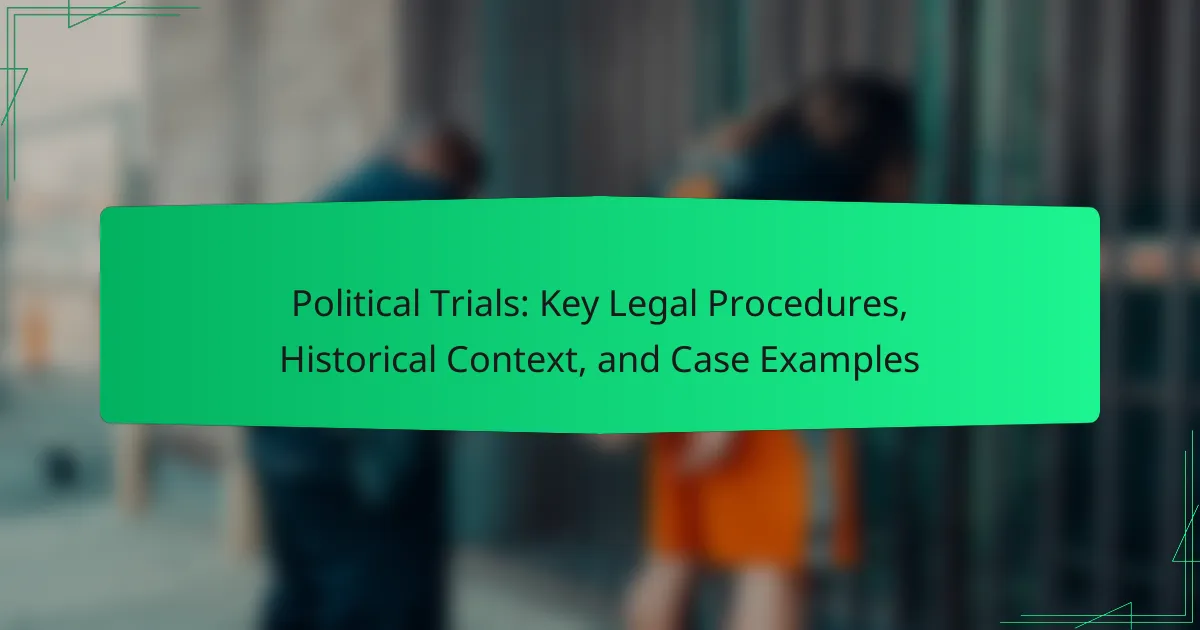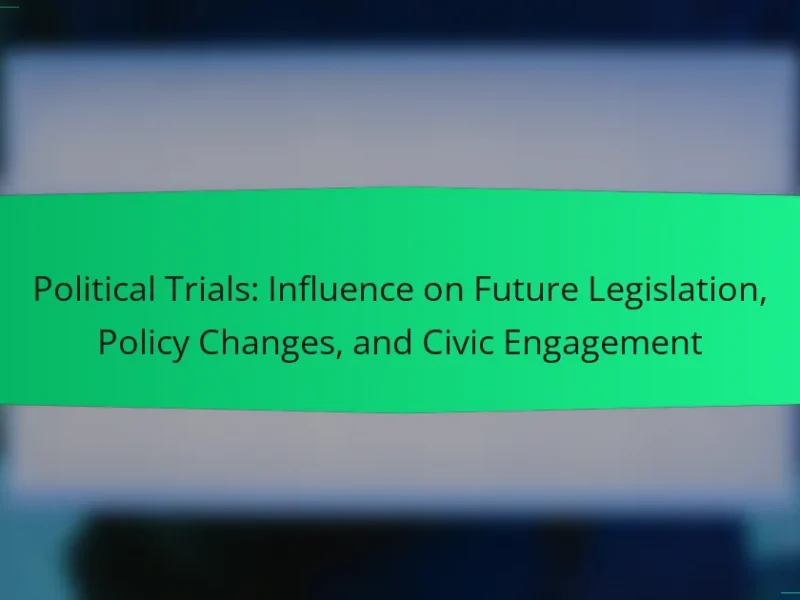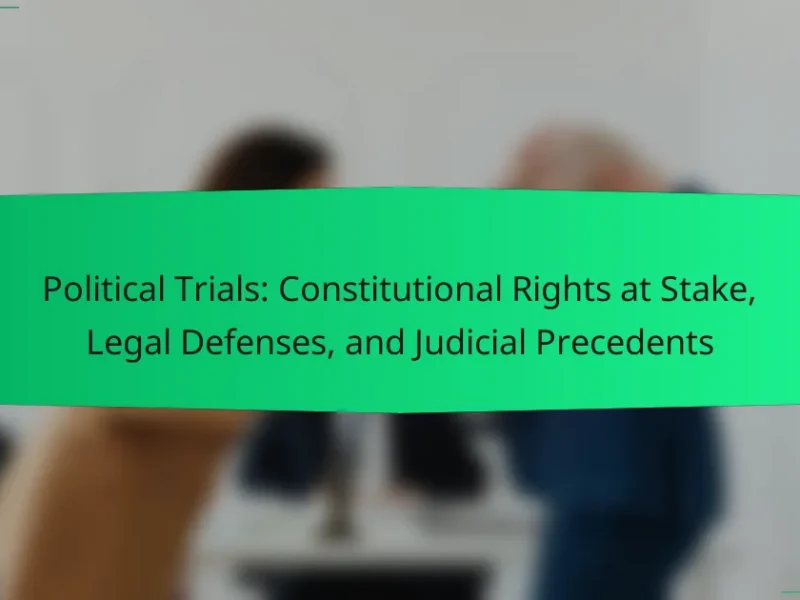Political trials are legal proceedings involving political figures or significant political issues, often occurring during times of political conflict or upheaval. These trials can be utilized by governments to suppress dissent and legitimize their actions, raising questions about justice and fairness. Historical examples include the Nuremberg Trials, which held leaders accountable for war crimes, and the trial of Socrates, who faced charges of corrupting the youth of Athens. Additionally, the Chicago Seven trial and Nelson Mandela’s trial illustrate the tensions between authority and dissent in various political contexts. This article explores the historical context, key legal procedures, and notable case examples of political trials, highlighting their impact on society and legal standards.
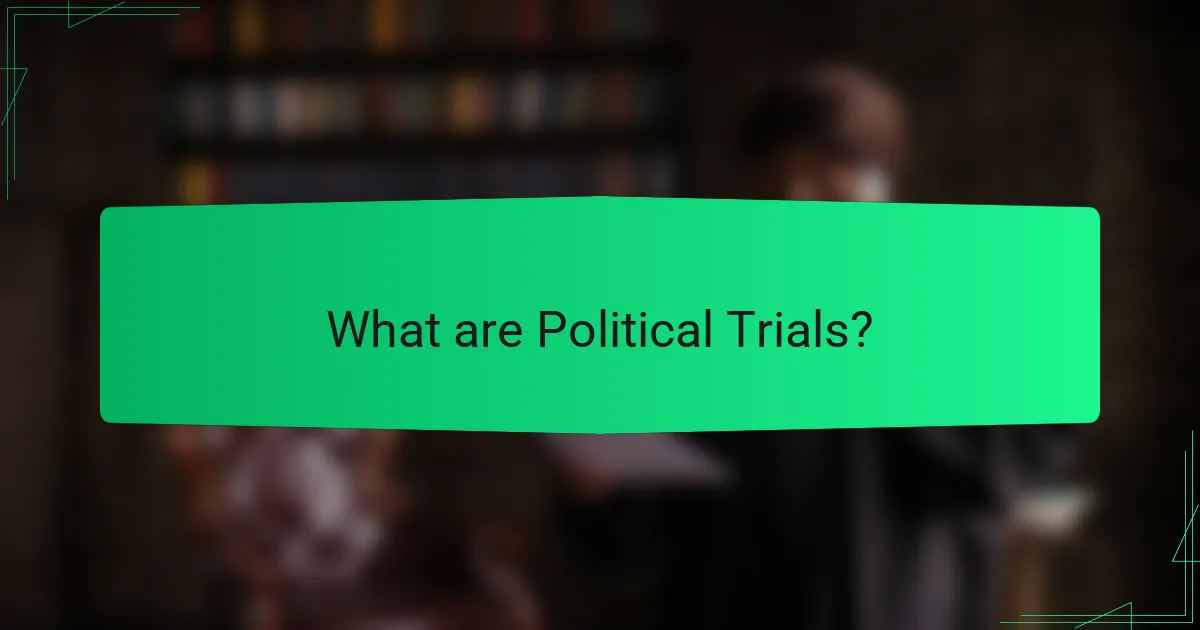
What are Political Trials?
Political trials are legal proceedings that involve political figures or issues of significant political importance. They often arise in contexts of political conflict or upheaval. These trials can serve as instruments of state power against dissenters. They may also be used to legitimize the actions of a ruling government. Historical examples include the Nuremberg Trials after World War II. In these cases, leaders were held accountable for war crimes. Political trials can raise questions about justice and fairness. They often attract international scrutiny and debate.
How are Political Trials defined in legal contexts?
Political trials are legal proceedings that involve government officials or political figures accused of crimes related to their public duties. These trials often occur in highly charged political environments. They can involve charges such as corruption, abuse of power, or treason. Political trials may lack the impartiality typical of standard judicial processes. Historical examples include the trials of political leaders during regime changes or revolutions. These trials can serve to reinforce or challenge political authority. The outcomes often reflect broader societal conflicts and power dynamics. Such trials are scrutinized for their implications on justice and governance.
What distinguishes Political Trials from other types of trials?
Political trials are distinguished by their focus on political issues and the involvement of government authority. Unlike other trials, they often address actions against the state or its representatives. Political trials can involve charges related to treason, sedition, or conspiracy. They typically feature heightened scrutiny and media attention. The motivations behind these trials may include suppressing dissent or consolidating power. Historical examples include the trial of Socrates in ancient Athens and the Nuremberg Trials post-World War II. These cases highlight the intersection of law and politics, often resulting in controversial outcomes.
What are the common characteristics of Political Trials?
Political trials typically exhibit characteristics such as high political stakes and public interest. They often involve government officials or political dissidents. The legal proceedings may lack impartiality due to political influence. Evidence presented can be selective or manipulated to support a political agenda. The trials frequently attract significant media attention, shaping public perception. Additionally, outcomes may be predetermined by political motivations rather than legal merits. Historical examples, such as the trial of the Chicago Seven, illustrate these traits.
Why do Political Trials occur?
Political trials occur primarily to address alleged violations of laws by political figures. These trials often emerge during times of political strife or unrest. They can serve as a mechanism for accountability in governance. Political trials may also aim to reinforce or challenge the legitimacy of a regime. For instance, historical examples include the Nuremberg Trials, which sought justice for war crimes. Such trials can reflect societal conflicts and power dynamics. They often influence public perception of justice and governance. Political trials can also deter future misconduct by leaders.
What factors contribute to the initiation of Political Trials?
Political trials are initiated due to a combination of legal, political, and social factors. Legal frameworks often provide the basis for prosecuting individuals in political contexts. Political motivations can drive governments to initiate trials against opponents or dissenters. Social unrest or public opinion can also influence the decision to pursue a political trial. Historical precedents often shape the environment in which these trials occur. For example, during times of political upheaval, governments may resort to trials to consolidate power. Additionally, international pressure or human rights considerations can play a role in initiating political trials. These factors collectively create an environment conducive to the prosecution of political figures.
How do societal and political climates influence Political Trials?
Societal and political climates significantly influence political trials. These trials often reflect the prevailing attitudes and values of society. For instance, during times of political unrest, trials may be used to suppress dissent. Governments may manipulate legal proceedings to target political opponents. Historical examples include the show trials in the Soviet Union, which aimed to consolidate power. Additionally, public opinion can sway the outcomes of trials. Media coverage and societal pressure can impact judicial decisions. In democratic societies, political trials may be influenced by civil rights movements. Overall, the interplay between societal norms and political power shapes the nature and conduct of political trials.
What are the key legal procedures involved in Political Trials?
Key legal procedures in political trials include pre-trial motions, jury selection, and trial proceedings. Pre-trial motions may involve challenges to evidence or the legality of the charges. Jury selection aims to ensure an impartial jury, often scrutinizing potential jurors’ biases. During trial proceedings, the prosecution presents evidence and witnesses first, followed by the defense. Closing arguments summarize each side’s case. The judge then instructs the jury on legal standards before deliberation. These procedures are critical to maintaining fairness, as seen in historical political trials like the Nuremberg Trials, which emphasized due process and legal standards.
What are the typical stages of a Political Trial?
The typical stages of a political trial include investigation, indictment, trial proceedings, and verdict. During the investigation stage, evidence is gathered and witnesses are interviewed. This phase determines if there is enough evidence for charges. The indictment stage follows, where formal charges are filed against the accused. This stage can involve political motivations influencing the charges.
Next, the trial proceedings commence. This includes presenting evidence, examining witnesses, and making legal arguments. The trial may be conducted in a public forum or a closed setting, depending on the case’s sensitivity. Finally, the verdict is delivered. The outcome can be influenced by public opinion and political pressure. Historical examples illustrate these stages, such as the impeachment trials of U.S. presidents, which demonstrate the political intricacies involved.
How does the legal framework differ in Political Trials compared to regular trials?
Political trials typically operate under a different legal framework than regular trials. In political trials, the prosecution may prioritize state interests over individual rights. Regular trials focus on the application of law based on established legal principles. Political trials often involve heightened scrutiny and may lack impartiality. Regular trials generally ensure a fair trial standard, including jury rights and legal representation. Political trials can be influenced by political agendas, impacting the judicial process. Regular trials adhere to established procedural norms and legal precedents. Historical examples show that political trials, such as those during authoritarian regimes, often disregard due process. This divergence highlights the complex interplay between law and politics in judicial proceedings.
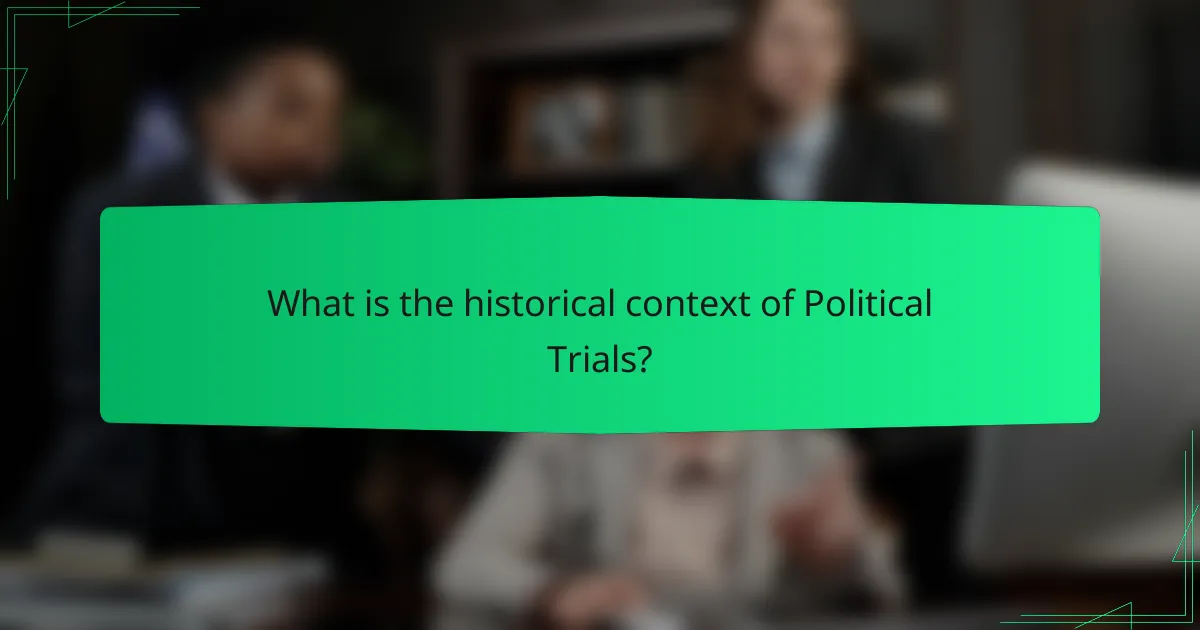
What is the historical context of Political Trials?
Political trials have a long history, often reflecting the tensions between authority and dissent. They typically arise in contexts of political unrest or regime change. Historical examples include the trials of political dissidents in totalitarian regimes. The Nuremberg Trials post-World War II set a precedent for international law. These trials aimed to hold leaders accountable for war crimes. In the United States, the McCarthy era saw numerous political trials targeting alleged communists. The historical context shows that political trials often serve as tools for governments to suppress opposition. They can influence public perception and shape legal standards.
How have Political Trials evolved over time?
Political trials have evolved significantly over time, reflecting changes in legal frameworks and societal values. In ancient times, political trials often served as tools for rulers to eliminate dissent. For example, during the Roman Empire, trials were frequently used to punish political rivals.
With the rise of democratic ideals, the 18th and 19th centuries saw a shift towards more structured legal processes. Political trials began to incorporate principles of due process and fairness. The trial of Socrates in Ancient Greece highlighted the intersection of law and politics, emphasizing the need for justice.
The 20th century introduced international norms, such as those established by the Nuremberg Trials after World War II. These trials set precedents for holding leaders accountable for crimes against humanity. Today, political trials often involve complex legal challenges, including issues of human rights and international law.
Current political trials are scrutinized for their fairness and transparency. The evolution of political trials reflects broader societal changes, including the increasing demand for accountability and justice.
What are some significant historical Political Trials?
Significant historical political trials include the trial of Socrates in 399 BC, which resulted in his execution for corrupting the youth of Athens. The trial of Galileo Galilei in 1633 led to his condemnation for heresy due to his support of heliocentrism. The Nuremberg Trials from 1945 to 1946 held Nazi leaders accountable for war crimes following World War II. The Rosenberg trial in 1951 resulted in the execution of Julius and Ethel Rosenberg for espionage in the United States. The trial of Nelson Mandela and others in 1964 during the Rivonia Trial highlighted the struggle against apartheid in South Africa. Each of these trials significantly impacted political discourse and legal precedents in their respective contexts.
How have past Political Trials influenced current legal practices?
Past political trials have significantly influenced current legal practices by establishing precedents in judicial proceedings. These trials often highlighted the balance between state security and individual rights. For instance, the Nuremberg Trials set standards for prosecuting war crimes and crimes against humanity. They introduced the concept of universal jurisdiction, allowing nations to prosecute offenders regardless of where the crime occurred. Similarly, the Watergate scandal led to greater scrutiny of executive power and reinforced the importance of checks and balances. It resulted in legal reforms aimed at increasing transparency and accountability in government. Additionally, the trials of political dissidents in various countries have shaped international human rights law. They have prompted the establishment of legal frameworks to protect individuals from political persecution. Overall, past political trials have laid the groundwork for evolving legal standards that prioritize justice and accountability.
What role do Political Trials play in governance?
Political trials serve as mechanisms for accountability and justice within governance. They address misconduct by public officials and uphold the rule of law. Political trials can deter future corruption by demonstrating that legal consequences exist for unethical behavior. Historical examples include the impeachment trials of U.S. Presidents, which highlight the checks and balances inherent in governance. These trials often reflect societal values and political climates. They can also prompt public discourse on governance and ethics. Ultimately, political trials reinforce the integrity of political institutions.
How do Political Trials impact public trust in legal systems?
Political trials can significantly undermine public trust in legal systems. They often appear to be influenced by political motives rather than objective justice. This perception can lead to skepticism about the fairness of the legal process. Historical examples illustrate this impact. The trial of former President Richard Nixon after the Watergate scandal raised doubts about the integrity of the justice system. Similarly, political trials in authoritarian regimes often result in public disillusionment with legal institutions. These events highlight how political trials can erode confidence in the impartiality of the law. As a result, citizens may become less willing to engage with the legal system.
What are the implications of Political Trials on political stability?
Political trials can significantly impact political stability. They often lead to polarization within society. This polarization can create divisions among political factions. As a result, trust in governmental institutions may decline. Historical examples include the Nuremberg Trials, which aimed to hold leaders accountable but also sparked debates on justice versus political expediency. In some cases, political trials can result in civil unrest or protests, further destabilizing the political landscape. The perception of bias in these trials can exacerbate tensions. Overall, the implications of political trials on political stability are complex and multifaceted.
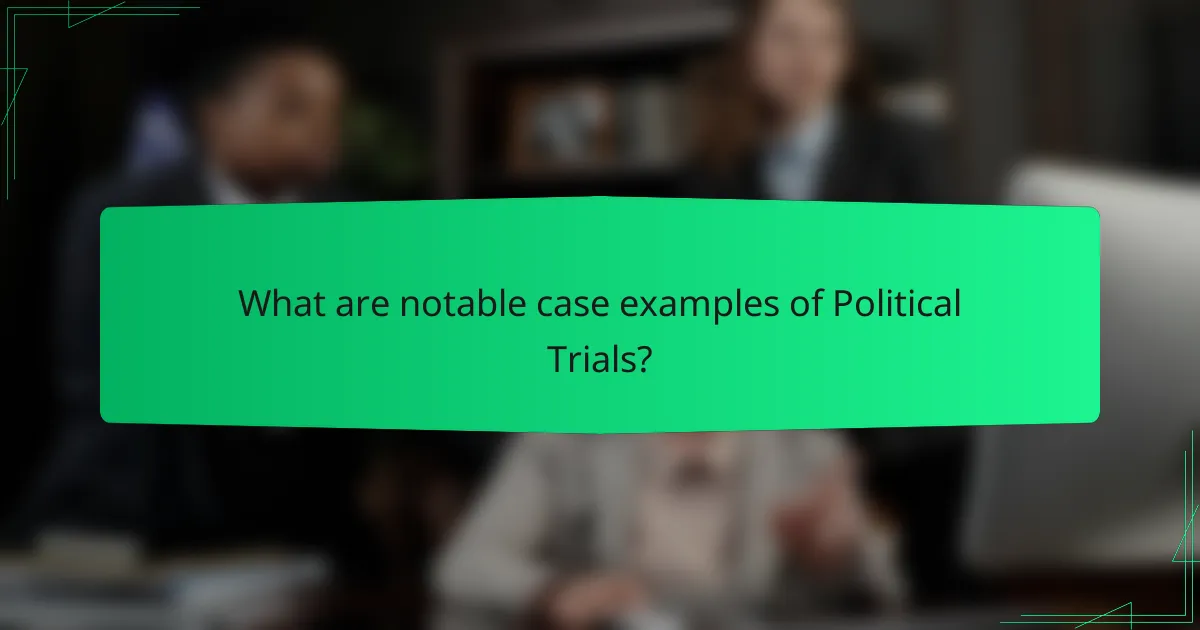
What are notable case examples of Political Trials?
Notable case examples of political trials include the trial of Socrates in 399 BC. Socrates was charged with corrupting the youth of Athens and impiety. He was sentenced to death by drinking poison. Another significant case is the trial of the Chicago Seven in 1969. This trial involved anti-Vietnam War activists accused of conspiracy and inciting riots. The trial highlighted tensions between the government and counterculture movements. The Nuremberg Trials after World War II are also notable. These trials prosecuted Nazi war criminals for crimes against humanity. They established important precedents in international law. The trial of Nelson Mandela and others in 1964 is significant as well. They were charged with sabotage against the apartheid regime in South Africa. Mandela was sentenced to life imprisonment. Each of these trials reflects broader political and social struggles of their time.
What are some landmark Political Trials in various countries?
Landmark political trials have occurred in various countries, often shaping legal and political landscapes. The Nuremberg Trials in Germany prosecuted Nazi war criminals after World War II. These trials established precedents for international law and accountability. In South Africa, the Rivonia Trial led to the imprisonment of Nelson Mandela and others for anti-apartheid activities. This trial highlighted the struggle against racial oppression. The Watergate Scandal in the United States resulted in the trial of several officials, leading to President Nixon’s resignation. This trial underscored the importance of checks and balances in governance. In Turkey, the trial of military coup leaders in 2012 addressed past human rights violations. This trial aimed to promote justice and accountability in the military’s role in politics. Each of these trials has had significant implications for their respective nations and beyond.
How did the outcomes of these trials shape public policy?
Outcomes of political trials significantly influenced public policy by prompting legal reforms and regulatory changes. For instance, the trials often revealed systemic issues within governance. These revelations led to increased public demand for accountability and transparency. Consequently, policymakers enacted laws aimed at preventing similar injustices. Historical examples include the Watergate scandal, which resulted in the establishment of stricter campaign finance laws. Similarly, the Nuremberg Trials set precedents for international law and human rights protections. Such outcomes demonstrate how trials can catalyze shifts in public policy frameworks.
What lessons can be learned from these notable cases?
Notable cases in political trials reveal critical lessons about justice and governance. They highlight the importance of due process in legal proceedings. For instance, the Nuremberg Trials emphasized accountability for war crimes. They also demonstrated the necessity of impartiality in judicial systems. Historical examples show that political influence can undermine legal integrity. The Watergate scandal illustrated the consequences of executive overreach. Furthermore, these cases stress the need for transparency in legal processes. Overall, they teach that protecting civil liberties is essential for a healthy democracy.
How do contemporary Political Trials reflect current issues?
Contemporary political trials reflect current issues by highlighting societal divisions and the influence of power dynamics. These trials often serve as a lens through which public sentiment and political tensions are examined. For example, trials involving political figures can reveal underlying issues such as corruption, abuse of power, and accountability. High-profile cases like the impeachment trials of political leaders demonstrate how legal proceedings intersect with public opinion and media narratives. Additionally, these trials can underscore the role of judicial systems in addressing or perpetuating inequality. The outcomes of such trials often shape political discourse and influence future governance.
What recent Political Trials have garnered international attention?
Recent political trials that have garnered international attention include the trial of former U.S. President Donald Trump. He faced multiple indictments related to election interference and classified documents. Another significant case is the trial of Myanmar’s Aung San Suu Kyi, who was sentenced on charges widely viewed as politically motivated. Additionally, the trial of Brazilian President Jair Bolsonaro regarding his handling of the COVID-19 pandemic has attracted scrutiny. These trials reflect ongoing global concerns about political accountability and justice.
How do these trials address modern political challenges?
Political trials address modern political challenges by providing a legal framework for accountability. They allow governments to address issues such as corruption, human rights violations, and abuse of power. For example, the trial of former leaders for war crimes can establish precedents for justice. These trials can also promote transparency in governance. They serve as a deterrent against future misconduct by public officials. Additionally, they can foster public discourse on political ethics. This process can strengthen democratic institutions by reinforcing the rule of law. Overall, political trials play a crucial role in shaping political accountability and integrity.
What best practices should be considered in Political Trials?
Best practices in political trials include ensuring impartiality, maintaining transparency, and safeguarding defendants’ rights. Impartiality is crucial for fair outcomes. Judges and juries should be free from political influence. Transparency fosters public trust in the judicial process. Open proceedings allow scrutiny and accountability. Safeguarding defendants’ rights protects against abuses. This includes access to legal representation and fair trial guarantees. Historical examples show that adherence to these practices leads to more legitimate outcomes. Notable cases, such as the Nuremberg Trials, highlight the importance of these principles in maintaining justice.
How can fairness and transparency be ensured in Political Trials?
Fairness and transparency in political trials can be ensured through several mechanisms. Independent judiciary systems are crucial. They help prevent bias and uphold legal standards. Open court proceedings promote transparency. This allows public scrutiny of the trial process. Access to legal representation is essential. Defendants should have qualified attorneys to advocate for their rights. Clear and consistent legal standards must be applied. This ensures that all parties understand the rules governing the trial. Oversight by independent bodies can enhance accountability. These entities can monitor the trial for compliance with legal norms. Public reporting and media coverage also play important roles. They inform the public about the proceedings and outcomes. Historical examples, such as the Nuremberg Trials, illustrate these principles in action. These trials emphasized the importance of due process and public scrutiny.
What strategies can legal systems adopt to improve Political Trial outcomes?
Legal systems can adopt several strategies to improve political trial outcomes. These strategies include ensuring judicial independence, enhancing transparency, and promoting fair trial standards. Judicial independence protects judges from external pressures, allowing them to make impartial decisions. Transparency in legal proceedings fosters public trust and accountability. Fair trial standards ensure that defendants receive adequate legal representation and that evidence is evaluated objectively. Historical examples show that countries with robust legal protections tend to have more equitable political trial outcomes. For instance, the establishment of independent judicial bodies in South Africa post-apartheid improved the fairness of political trials.
Political trials are legal proceedings involving political figures or issues of significant political importance, often arising in contexts of political conflict. This article examines the definition, characteristics, and historical context of political trials, highlighting their legal procedures and notable case examples. Key factors contributing to their initiation, societal influences, and implications for governance and public trust are discussed, alongside best practices for ensuring fairness and transparency. The evolution of political trials over time and their impact on contemporary legal practices are also explored, providing a comprehensive overview of this complex intersection between law and politics.
